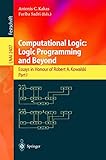Computational Logic: Logic Programming and Beyond [electronic resource] : Essays in Honour of Robert A. Kowalski Part I / edited by Antonis C. Kakas, Fariba Sadri.
Material type: TextSeries: Lecture Notes in Computer Science ; 2407Publisher: Berlin, Heidelberg : Springer Berlin Heidelberg, 2002Description: XII, 684 p. online resourceContent type: text Media type: computer Carrier type: online resourceISBN: 9783540456285Subject(s): Computer science | Artificial intelligence | Computer Science | Artificial Intelligence (incl. Robotics) | Programming Techniques | Mathematical Logic and Formal LanguagesAdditional physical formats: Printed edition:: No titleDDC classification: 006.3 LOC classification: Q334-342TJ210.2-211.495Online resources: Click here to access online
TextSeries: Lecture Notes in Computer Science ; 2407Publisher: Berlin, Heidelberg : Springer Berlin Heidelberg, 2002Description: XII, 684 p. online resourceContent type: text Media type: computer Carrier type: online resourceISBN: 9783540456285Subject(s): Computer science | Artificial intelligence | Computer Science | Artificial Intelligence (incl. Robotics) | Programming Techniques | Mathematical Logic and Formal LanguagesAdditional physical formats: Printed edition:: No titleDDC classification: 006.3 LOC classification: Q334-342TJ210.2-211.495Online resources: Click here to access online  E-BOOKS
E-BOOKS
| Current library | Home library | Call number | Materials specified | URL | Status | Date due | Barcode |
|---|---|---|---|---|---|---|---|
| IMSc Library | IMSc Library | Link to resource | Available | EBK5485 |
A Portrait of a Scientist as a Computational Logician -- A Portrait of a Scientist as a Computational Logician -- Bob Kowalski: A Portrait -- Bob Kowalski: A Portrait -- Directions for Logic Programming -- Directions for Logic Programming -- Logic Programming Languages -- Agents as Multi-threaded Logical Objects -- Logic Programming Languages for the Internet -- Higher-Order Computational Logic -- A Pure Meta-interpreter for Flat GHC, a Concurrent Constraint Language -- Program Derivation and Properties -- Transformation Systems and Nondeclarative Properties -- Acceptability with General Orderings -- Specification, Implementation, and Verification of Domain Specific Languages: A Logic Programming-Based Approach -- Negation as Failure through Abduction: Reasoning about Termination -- Program Derivation = Rules + Strategies -- Software Development -- Achievements and Prospects of Program Synthesis -- Logic for Component-Based Software Development -- Patterns for Prolog Programming -- Extensions of Logic Programming -- Abduction in Logic Programming -- Learning in Clausal Logic: A Perspective on Inductive Logic Programming -- Disjunctive Logic Programming: A Survey and Assessment -- Constraint Logic Programming -- Applications in Logic -- Planning Attacks to Security Protocols: Case Studies in Logic Programming -- Multiagent Compromises, Joint Fixpoints, and Stable Models -- Error-Tolerant Agents -- Logic-Based Hybrid Agents -- Heterogeneous Scheduling and Rotation.
Alan Robinson This set of essays pays tribute to Bob Kowalski on his 60th birthday, an anniversary which gives his friends and colleagues an excuse to celebrate his career as an original thinker, a charismatic communicator, and a forceful intellectual leader. The logic programming community hereby and herein conveys its respect and thanks to him for his pivotal role in creating and fostering the conceptual paradigm which is its raison d’Œtre. The diversity of interests covered here reflects the variety of Bob’s concerns. Read on. It is an intellectual feast. Before you begin, permit me to send him a brief personal, but public, message: Bob, how right you were, and how wrong I was. I should explain. When Bob arrived in Edinburgh in 1967 resolution was as yet fairly new, having taken several years to become at all widely known. Research groups to investigate various aspects of resolution sprang up at several institutions, the one organized by Bernard Meltzer at Edinburgh University being among the first. For the half-dozen years that Bob was a leading member of Bernard’s group, I was a frequent visitor to it, and I saw a lot of him. We had many discussions about logic, computation, and language.


There are no comments on this title.